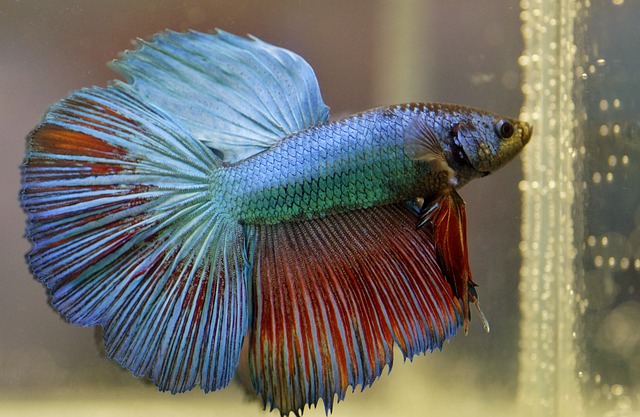Table of Contents
As a betta fish owner, it can be distressing to discover that your beloved pet may have passed away. But how can you tell if your betta fish is actually dead? In this article, we’ll explore the signs that indicate a betta fish has passed away, including physical and behavioral changes. We’ll also provide insights into the different factors that can impact the health of betta fish, and offer tips on how to properly care for them to prevent premature death.
Whether you’re a seasoned aquarium owner or a first-time betta fish parent, you’ll gain a deeper understanding of the signs of a deceased betta fish and how to properly care for these beautiful creatures. So, if you’re ready to learn more about how to tell if your betta fish is dead, let’s dive in and get started!
One of the most obvious signs that your betta fish has passed away is that it will no longer be moving or swimming in the tank. If you notice that your betta is not moving or responding to stimuli, it may be a sign that it has passed away. Another sign to look for is a lack of gill movement. If your betta’s gills are not moving, it may be a sign that it is not breathing and has passed away.
Understanding Betta Fish Behavior
Betta fish are known for their vibrant colors and unique personalities. To properly care for your betta fish, it’s important to understand their behavior. This will help you recognize when something is wrong and take appropriate action.
Sleeping or Dead
One common concern among betta fish owners is determining whether their fish is sleeping or dead. Betta fish can sleep in a variety of positions, including lying on the bottom of the tank or floating near the surface. If your betta fish is sleeping, they may still be responsive to movement or sound. To check if your betta fish is alive, gently tap the side of the tank or move your hand near them. If they respond, they are likely sleeping. However, if there is no response, it’s possible that your betta fish has passed away.
Happy or Stressed
Betta fish can display a range of emotions, including happiness and stress. A happy betta fish will be active, curious, and display vibrant colors. They may also flare their fins in response to other fish or their reflection. On the other hand, a stressed betta fish may display dull colors, hide in their tank, or refuse to eat. They may also clamp their fins against their body or play dead. If you notice any of these signs, it’s important to evaluate your betta fish’s living conditions and make any necessary changes.
Overall, understanding betta fish behavior is key to providing the best possible care for your fish. By observing their behavior and making adjustments as needed, you can ensure that your betta fish remains happy and healthy.
Physical Signs of a Dying Betta Fish
If you are a betta fish owner, it is important to be able to identify the signs of a dying betta fish. In this section, we will discuss the physical signs you should look for to determine if your betta fish is in distress.
Coloration Changes
One of the most noticeable signs of a dying betta fish is a change in coloration. If your betta fish is losing its vibrant colors or if its colors are fading, it may be a sign that your fish is not feeling well. A betta fish that is losing its colors may also have a pale or washed-out appearance.
Clamped Fins
Another physical sign of a dying betta fish is clamped fins. A healthy betta fish will have its fins spread out and will move them around frequently. If your betta fish is keeping its fins clamped close to its body, it may be an indication that your fish is in distress.
Bulging Eyes
Bulging eyes are another sign that your betta fish may be in distress. If your betta fish’s eyes appear to be bulging out of its head, it may be a sign of an underlying health issue.
Raised Scales
Raised scales are a physical sign of a serious condition known as dropsy. If your betta fish’s scales appear to be raised or pinecone-like, it may be a sign that your fish is suffering from dropsy.
White Spots
White spots on your betta fish’s body may be a sign of a parasitic infection known as ich. If you notice white spots on your betta fish’s body, it is important to take action quickly to prevent the spread of the infection.
In conclusion, knowing the physical signs of a dying betta fish can help you identify when your fish is in distress and take action to address any underlying health issues. Keep an eye out for changes in coloration, clamped fins, bulging eyes, raised scales, and white spots to ensure the health and well-being of your betta fish.
Betta Fish Illnesses and Infections
Betta fish are susceptible to a variety of illnesses and infections that can be fatal if left untreated. It is important to recognize the symptoms of these diseases and take appropriate action to prevent their spread.
Ich
Ich, also known as white spot disease, is a common parasitic infection that affects betta fish. Symptoms of ich include white spots on the fish’s body and fins, as well as scratching against objects in the aquarium. This infection can be treated with medication, but it is important to act quickly to prevent the spread of the disease.
Bacterial Infection
Bacterial infections can occur in betta fish due to poor water quality or injury. Symptoms of bacterial infection include lethargy, loss of appetite, and discoloration of the fish’s skin. Treatment for bacterial infections typically involves antibiotics and improving water quality in the aquarium.
Parasitic Infection
Parasitic infections can also affect betta fish and are often caused by poor water quality or improper feeding. Symptoms of parasitic infection include lethargy, loss of appetite, and visible parasites on the fish’s body. Treatment for parasitic infections typically involves medication and improving water quality in the aquarium.
Dropsy
Dropsy is a serious condition that affects the fish’s kidneys and can be fatal if left untreated. Symptoms of dropsy include bloating, lethargy, and protruding scales. Treatment for dropsy typically involves antibiotics and improving water quality in the aquarium.
In conclusion, it is important to monitor your betta fish for signs of illness and infection. By recognizing the symptoms of these diseases and taking appropriate action, you can help keep your fish healthy and happy.
Changes in Betta Fish Behavior
If you suspect that your betta fish may be dead, the first thing to do is to check for any changes in their behavior. Here are some common changes to look out for:
Lethargy
If your betta fish is lethargic, they may be floating near the surface of the water or resting on the bottom of the tank. They may also appear to be less active than usual, and may not swim around as much as they used to. Lethargy can be a sign of illness or stress, so it’s important to monitor your betta fish closely if you notice this behavior.
Loss of Appetite
If your betta fish is not eating, it may be a sign that they are ill or stressed. Betta fish are typically voracious eaters, so if you notice that your betta fish is not eating, it’s important to investigate the cause. Loss of appetite can be caused by a variety of factors, including poor water quality, illness, or stress.
Not Eating
If your betta fish is not eating, it may be a sign that they are ill or stressed. Betta fish are typically voracious eaters, so if you notice that your betta fish is not eating, it’s important to investigate the cause. Loss of appetite can be caused by a variety of factors, including poor water quality, illness, or stress.
If you notice any of these changes in your betta fish’s behavior, it’s important to take action. Monitor your betta fish closely, and consider taking them to a veterinarian who specializes in fish if you suspect that they may be ill. By paying attention to changes in your betta fish’s behavior, you can help ensure that they stay healthy and happy.
Betta Fish Tank Conditions
To keep your betta fish healthy and happy, you must ensure that their tank conditions are optimal. Here are some factors you should consider when setting up and maintaining your betta fish tank.
Water Temperature
Betta fish are tropical fish and require a water temperature between 75°F and 82°F. You can use an aquarium heater to maintain the ideal temperature range for your betta fish. Make sure to monitor the water temperature regularly to ensure that it remains stable.
Ammonia Levels
Ammonia is a toxic chemical that can build up in your betta fish’s tank. It is produced by the breakdown of fish waste and uneaten food. High levels of ammonia can be harmful to your betta fish’s health. You can use a test kit to monitor the ammonia levels in your tank. Ideally, the ammonia levels should be zero.
Nitrate and Nitrite Levels
Nitrate and nitrite are also toxic chemicals that can build up in your betta fish’s tank. They are produced by the breakdown of ammonia. High levels of nitrate and nitrite can be harmful to your betta fish’s health. You can use a test kit to monitor the nitrate and nitrite levels in your tank. Ideally, the nitrate levels should be below 40 ppm, and the nitrite levels should be zero.
pH Levels
The pH level of your betta fish’s tank is another critical factor to consider. Betta fish prefer a slightly acidic environment with a pH between 6.5 and 7.5. You can use a test kit to monitor the pH level in your tank. If the pH level is too high or too low, you can adjust it by adding aquarium-safe pH adjusters.
By maintaining optimal water conditions in your betta fish’s tank, you can ensure that they live a healthy and happy life.
Euthanizing a Betta Fish
If your betta fish is suffering from a serious illness or injury, it may be necessary to euthanize it. This is a difficult decision to make, but it can be the kindest thing to do for your pet. There are several methods for euthanizing a betta fish, but one of the most humane and effective is using clove oil.
When to Euthanize
Before you decide to euthanize your betta fish, it’s important to make sure that it is really necessary. Some signs that your fish may need to be euthanized include:
- Severe injury or illness that is causing your fish to suffer
- Your fish is no longer eating or swimming normally
- Your fish is showing signs of extreme stress, such as gasping for air or hiding in the corner of the tank
If you are unsure whether your betta fish needs to be euthanized, it’s a good idea to consult with a veterinarian or an experienced fish keeper.
Using Clove Oil
Clove oil is a natural anesthetic that can be used to euthanize fish. Here’s how to do it:
- Fill a small container with tank water.
- Add a few drops of clove oil to the container and stir gently.
- Use a net to gently transfer your fish to the container.
- Wait until your fish is completely anesthetized (it will stop moving and breathing).
- Once your fish is anesthetized, add a few more drops of clove oil to the container to ensure that your fish is fully euthanized.
- Leave your fish in the container for at least 30 minutes to ensure that it is dead.
- Dispose of your fish and the water in a humane and respectful manner.
It’s important to note that clove oil can be toxic to other fish and aquatic animals, so be sure to dispose of it properly. Additionally, it’s a good idea to avoid using clove oil if you are not comfortable handling it or if you have never euthanized a fish before. In these cases, it’s best to seek the advice of a professional or experienced fish keeper.
Conclusion
“Knowing how to tell if your betta fish is dead is important for any fish owner. By looking for signs such as lack of movement, unresponsiveness, and discoloration, you can determine if your betta fish has passed away.
Firstly, if your betta fish is not moving, it may be a sign that it has died. Secondly, if your betta fish is floating at the top of the tank or lying at the bottom of the tank, it may be an indication that it has passed away. Thirdly, if your betta fish is not responding to any stimuli, such as food or movement outside the tank, it may be another sign that it has died.
It is also important to note that the lifespan of a betta fish is typically two to three years. Therefore, if your betta fish is nearing the end of its lifespan, it may be more susceptible to death.
In the event that your betta fish has passed away, it is essential to remove it from the tank immediately to prevent any further contamination. You should also ensure that the tank is properly cleaned and disinfected before introducing any new fish.
Overall, it is crucial to be observant and knowledgeable about the signs of a dead betta fish to ensure that your fish is healthy and happy.







